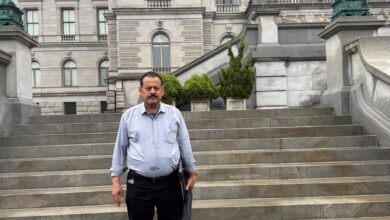A Day in Hell

Yemeni mp
Ahmed Saif Hashed
The absence of those few days made me feel estranged from school. That brief interruption left me feeling like an outsider among my peers. Perhaps my situation resembled the first day I attended this school—withdrawn, shy, and feeling the weight of loneliness and isolation.
The teacher summoned me to stand before him. Upon my arrival, he rose, alert and poised. He began dramatically, yet I sensed a boiling anger simmering within him. He circled around me, his rattan stick trembling in his hand, eager to strike at the skin that barely covered my weary bones.
He was as charged as a police officer who had finally found the suspect he had searched for tirelessly over the years. Driven by a long-held frustration, he sought to avenge the failures that had haunted him. As he brandished the stick before me, it was as if he had captured a long-awaited adversary, ready to unleash his pent-up fury. He wished to confront me with a devastating victory, to inflict upon me a humiliating defeat.
I stood there, exhausted, frail, and powerless. I had no strength to face the unknown that awaited me, its magnitude unknown and terrifying. I silently prayed it would be less destructive than I feared, while the teacher loomed over me, visibly seething with rage—a fury consuming him from within. He was intensely agitated, uncertain of where to begin.
He paused for a moment, then carefully selected four of his toughest students, commanding them to seize me, throw me to the ground, lift my legs together into the air, and prevent any movement.
They uprooted me from the ground like a weary little plant. My head was forced down, while my legs were raised high. I felt the disparity in our sizes shatter any comparison. They were using their strength to an extent I had never imagined—an absurd, overwhelming force. There was no comparison between my slight frame and the four imposing figures before me; I felt myself diminishing among them, almost disappearing under their weight. I was lost in their crowded presence, acting in a state of euphoric obedience, eager to demonstrate their loyalty to the teacher.
They immobilized my arms and body with their many hands, their weight pressing heavily on my small, exhausted frame. Some of them pressed their stone-like knees into my empty stomach and my constricted, gasping chest. They nearly suffocated me, and I felt the air I struggled to breathe amidst their throng was scarce and difficult to grasp. How miserly they were, even with the air I needed! It was as if they were usurers, granting me breath in meager, stifled portions—stinginess reached its peak.
The stinging blows of the rattan struck hard against the soles of my feet, like lava from hell poured upon my bloodied toes. This was not the usual punishment of the “flogging”; it was a torment from the depths of hell. Its intensity far surpassed anything endured by even the most neglectful, lazy, or foolish students in the school. In time, I would come to refer to that day as “A Day in Hell.
They finished their feast upon my frail body. My feet swelled; red blotches threatened to burst with blood. White spots formed at their bottoms and sides. My feet, which were supposed to carry me home, had become the burden I bore, as if I were carrying a mountain heavier than Uhud.
I walked with faltering steps, sometimes dragging my body like a cripple. I took twenty steps, or even fewer, then rested for a moment before resuming for another twenty. That journey felt like traversing a valley of hell. Each meter gained significance in this arduous trek. Twenty steps multiplied by twenty, until I finally reached home, my spirit barely intact.
I thought the punishment had ended there, especially since the teacher had informed my father that I had been punished sufficiently. However, my father, whom I hoped would lighten the burden imposed by the teacher, turned out to be even more severe in his discipline. My condition and plea for mercy from my father felt like a desperate cry for relief from fire to fire.
* * *
I reached the door of our home, and my father was waiting. He approached me with slow, measured steps. I thought perhaps God had shown me mercy, that a miracle had transformed my father, or that some compassion had surged within him, especially as he saw me, weary and limping, struggling to lift my feet with great difficulty. But he surprised me with an action I had not anticipated.
He spread his legs wide and lowered them significantly. His stature bent down to below my height. He placed his right shoulder at the middle of my back and lifted me, finding myself hunched over him like an inverted “W,” his hands gripping my legs, while my feet flailed like a slaughtered bird in front of him, turned upside down and raised slightly above his stature. My head dangled over his back like a slaughtered sheep.
My father’s movement was both startling and shocking to me. A wave of panic rushed over me, especially as I had no idea what he intended to do! What had he resolved? The angle of my downward view felt like a cosmic inversion of everything around me. I began to see things from my upside-down position, in a way that contradicted what people were used to seeing! I sensed that a new, more brutal punishment awaited me, yet I could not fathom what it would be!
I screamed in a devastating, continuous panic, while my father carried me toward a sidr tree near our home, where a rope was already prepared to hang me. He tied my feet with the rope and lifted me to a branch, my head dangling downward. My appearance was that of a slaughtered sheep, hung up for skinning or butchering.
I cried out in desperation, my screams piercing the heavens, hoping that some passerby would rush to my father’s aid and rescue me from my plight. Yet, there was no rescuer, no one to rush in. The adults watched from the rooftops of their homes, their doors closed like tombs, and some peered cautiously from windows and gaps, while my father surprised me with more.
He struck me violently with a stick across my back, belly, and legs, with no one coming to my rescue. My mother was on the mountain, my cries tearing through the sky, while the stings of the stick gnawed at my body like a hungry hyena feasting on its prey.
My screams seemed like an open invitation, a free announcement calling children and women to witness a spectacle they had never seen before, not even in their first or second or third year of life. They had never encountered anything like it. It was a bizarre scene that demanded attention, urging onlookers to remain vigilant and not let their eyes wander for even a moment. It was a sight our village had never witnessed, no matter how rebellious, disobedient, or even insane the child might be.
Some children rushed over to get a closer look at this strange spectacle they were witnessing for the first time. They watched as if attending a cinema, captivated by a film they had never seen before, presented to them for free. As for me, the memory of that moment remains etched in my mind to this day. Yet, despite it all, I hold nothing but deep love and forgiveness for my father.
After my father had vented his anger, I remained hanging from the tree until my mother hurried down from the mountain to rescue me, freeing me from my bonds after what felt like an eternity.
* * *
The harshness of yesterday, at its core, stemmed from a desire for discipline, no matter how misguided the actions were. In good intentions, there lies a form of mercy. However, the cruelty of today is driven by excessive selfishness. We are now besieged by unprecedented corruption and plunder, and a level of injustice and brutality that seems beyond imagination, fueled by nations driven by insatiable greed and self-serving interests, alongside their reckless and terrifying sadism.
Everyone has taken from us and from our homeland more than ever before, as the world’s evildoers have conspired against us, while others merely stand by and watch. We have no mother rushing from a valley or mountain to halt this fierce war, this deadly siege, the immense looting and corruption, and this prolonged bleeding.
* * *
And speaking of which, after I published this story, another tale unfolded—one filled with both humor and disappointment.
The Minister of Finance, Sharaf Al-Kahlani, displayed much humility and graciousness. However, in my dealings with him, I often ended up with nothing. At times, he would offer insights that initially seemed extraordinary, and I could see the astonishment etched on the faces of those he addressed. One person even told me it was an unprecedented gesture from the minister. Yet, as I continued to follow up, I would discover that it was merely a mirage, or perhaps an illusion wrapped in sweetness.
I accompanied the esteemed minister from the House of Representatives in his luxurious car, heading towards his ministry. I was taken aback when he inquired about the well-being of “the comrade.” I suspected he had used the term out of courtesy or perhaps as a token of goodwill.
He informed me that he followed what I published about the details of my life, specifically recalling the story of my childhood habit of eating dirt. When we reached the elevator door, each of us insisted that the other enter first, out of respect and appreciation, until his humility overwhelmed me. As soon as we reached his office, he issued me a directive that seemed extraordinary, a departure from his usual caution.
I approached the relevant authorities as if I were a knight mounted on a steed. I appeared confident, believing that I would reclaim some of what was taken from me.
After much back and forth and exhausting follow-ups, the result tasted like dirt—not the delightful flavor of my childhood but the bitter taste of compounded disappointment.
I met the minister a second and perhaps a third time, greeted by his warmth and cordiality, yet each encounter ended in disillusionment that I could not understand. Some claimed there was a green light for those in power or favor with him, while a red light awaited those without the support or approval of authority—this red light perhaps exceeding even the minister’s own powers.
Overwhelmed by frustration from all sides, I said to the minister, “They say you are the most dishonest minister, but I never believed it.” He asked for a copy of a memo I had, writing simply “Mohammed Amer” on it, and promised to follow up after previous assurances that had led nowhere.
I was informed that the processing was stalled with the minister’s deputy, Mohammed Amer, who was said to be an expert in ministry affairs, the one who held all the power, leaving the ministers powerless in his shadow. I rushed to him, anger surging within me, while he greeted my fury with warmth and open arms.
I met his welcome with my anger, saying, “Now I know my adversary in the Ministry of Finance is you. I’ve long searched for the one hindering my dealings, and today I’ve discovered it is you.”
I could not contain my rage, which felt like it was about to explode. I insisted that I was right and sought to disprove him and his assurances. He laughed, took the minister’s direction, and began working on my case personally, assuring me he would supervise its progress.
As I turned to leave his office with the assigned employee, he surprised me by calling my name from his chair. I paused and looked back to hear him say:
“Judge Ahmed, I read your story about the time your father hung you from the tree.”
Laughter erupted from everyone in his office, and I continued on my way, chuckling along with them.
I asked my companion, Nabil Al-Husam, what he meant by that. He replied sarcastically:
“Don’t you get it? He means if your father couldn’t manage you and hung you from a tree, how can he understand you? He implies you are a disobedient child, and bent out of shape. We burst into laughter, praising his wit and his gentle way of responding—and of punishing as well.
Despite all this, I achieved nothing for two long years of relentless follow-ups without results, and this success came during the term of the minister who succeeded him. The most pressing question remained:
-If this happens to a representative of the people regarding their rightful claims, how must it be for a citizen without influence, support, or backing?!!
* * *






